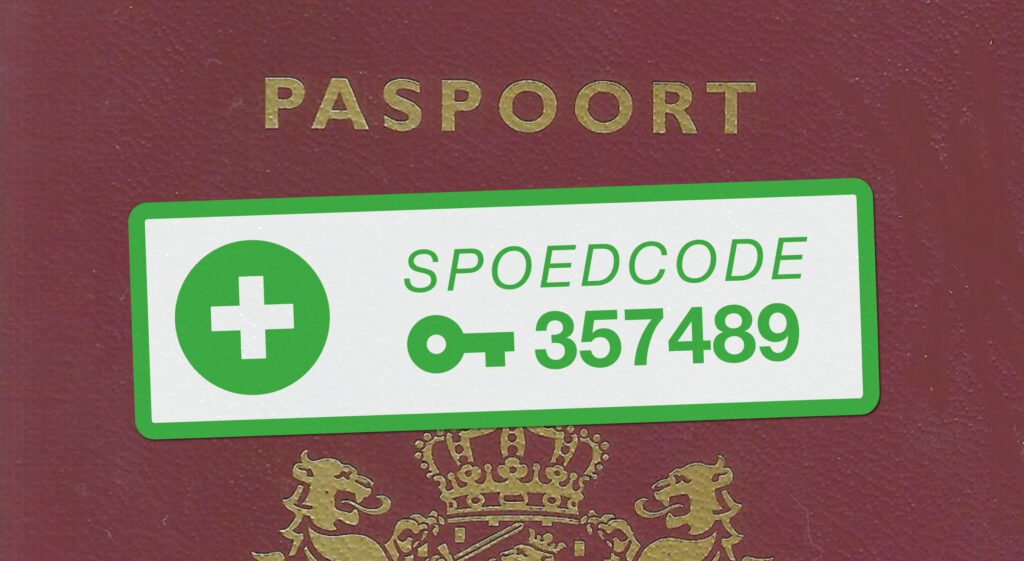Urgency as it should be
You live in Utrecht and run into a lamppost in Groningen. Unconscious, you are picked up by the ambulance. How do those healthcare providers get direct access to your medical data?
For 13 years, this example has been put forward as 'the problem'. The solution is there for the taking, but a cartel of healthcare stakeholders is doing everything it can to avoid being seen and (again) pushing other interests onto the agenda. Next Wednesday House of Representatives consults on acute care.
The emergency case
In most cases, 90% of care, you consult with your doctor in the consulting room about a possible referral. This then includes a set of data that your doctor shares with your next healthcare provider. Consent may be 'supposed'. After all, you are in it yourself.
But in emergency cases, there is no referral and so your 'explicit consent' required before the ambulance nurse can retrieve your data. And that is not possible if you are unconscious.
The emergency case thus requires a central Electronic Exchange System (EUS) that can unlock data even if you cannot give consent.
Rush EUS
Central systems are not necessarily bad, but if you set them up wrong, risks do arise. The biggest problem with the National EHR (now National Switch Point, LSP) in 2011 was that all medical data, from everyone, in advance unfocused were made available to all caregivers.
In an Emergency US, those risks are mitigated: access is targeted and specifically.
- An Emergency EUS can only be used by the ambulance, general practitioners' clinic (HAP) and emergency room (ED).
- In an emergency, only a very limited set of medical data is needed. You can modify the standard set, in consultation with your GP.
Actually, this is what the Landelijk EPD (LSP) should have been in 2011: a public (open-source) solution that is functionally and technically only to be used for urgent care. In that case, the risks of opting out are manageable and your data are always retrievable, even if you are out of the loop.
Only one legal adjustment is needed: an opt-out for the Rush EUS.
Rush Code
Do you really not trust central systems? Then there is the 'Rush Code'.
“Who is this?" wonders the nurse, or "What is this patient's BSN?" Because no BSN = no data. However, your identity card contains something else: a sticker with a secret Rush Code. The only place you reveal that secret is on your identity card. This is because your BSN and the reference to your emergency data are stored encrypted in the Emergency EUS and the Emergency Code is the key.
With this comes a additional low security available, to anyone who wants it, on top of the guarantees of the Emergency US.
Incidentally, this solution can already be implemented today. When using an Express Code, the Express EUS does not process BSNs, so a change in the law (opt-out) is not needed for this.

Healthcare cartel
However, the Healthcare Cartel has other plans. Along 'urgent care' lines, the members now aim to achieve an opt-out for the former National SPD (LSP) as yet. This works as follows.
Most signatories of the lobby letter its directors of VZVZ, provider of the LSP. The LSP is informally the candidate 'generic facility' for the exchange of emergency and medication data, but the LSP (rightly) requires explicit consent, i.e. an 'opt-in'.
The Healthcare Cartel is now calling for an "opt-out" for certain data (emergency and medication), regardless of the infrastructure. This way, everyone can still be included in the former National SPD (LSP) and once again a far too wide disclosure of data is realised.
It then refers to a draft law, the WOGS, which allows almost any situation to be labelled 'urgent'. The mere possibility that there may be an emergency is enough reason to disclose data.
Call to the chamber
- Choose a Rush EUS: A public open-source solution that can be used functionally and technically exclusively for emergency care;
- realize the emergency code for those who want to use them;
- Reserve the 'opt-out' for a system/infrastructure, not for a set of data.
(Oh, and everything within the current definition of 'emergency care' so.)
